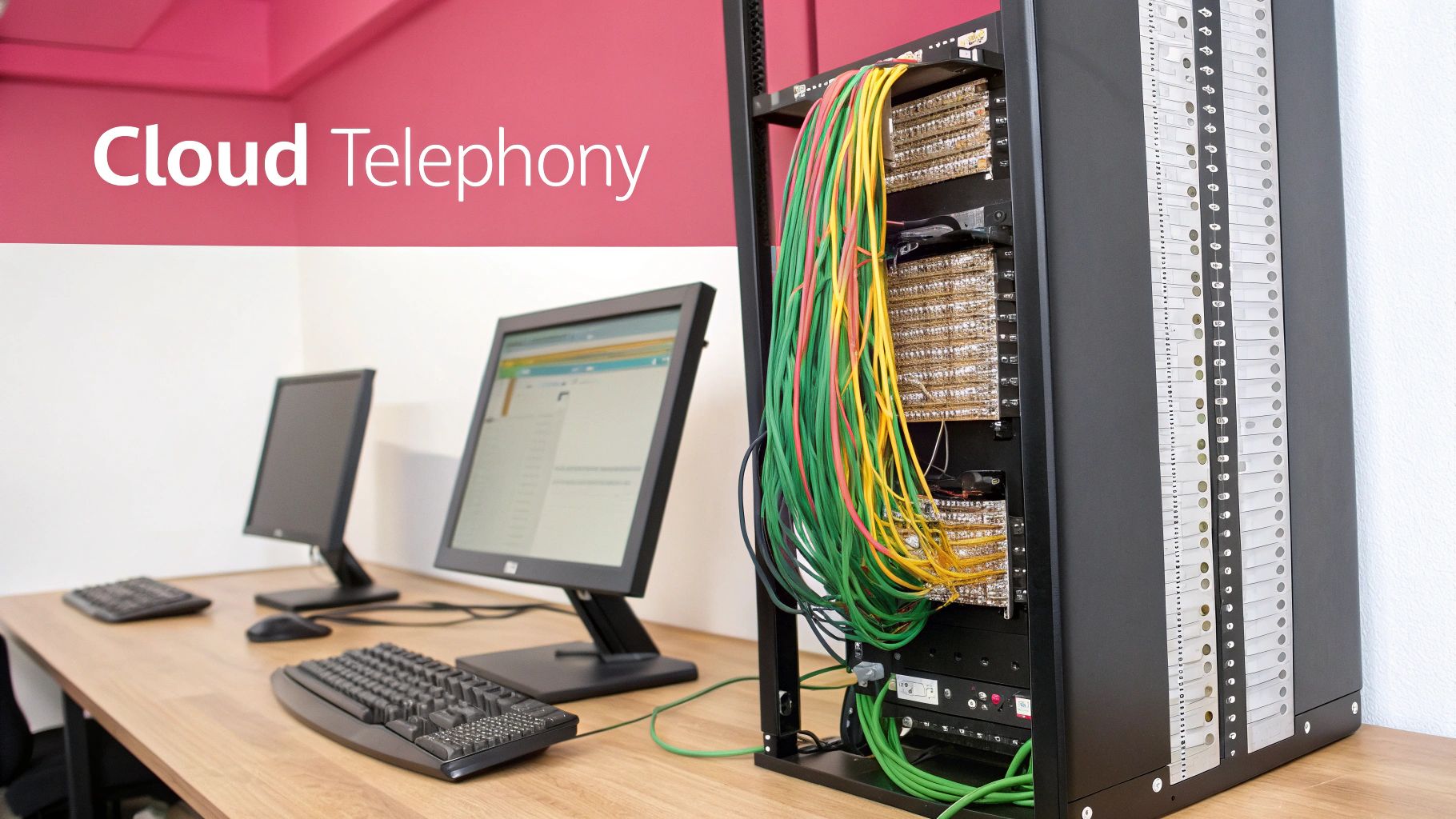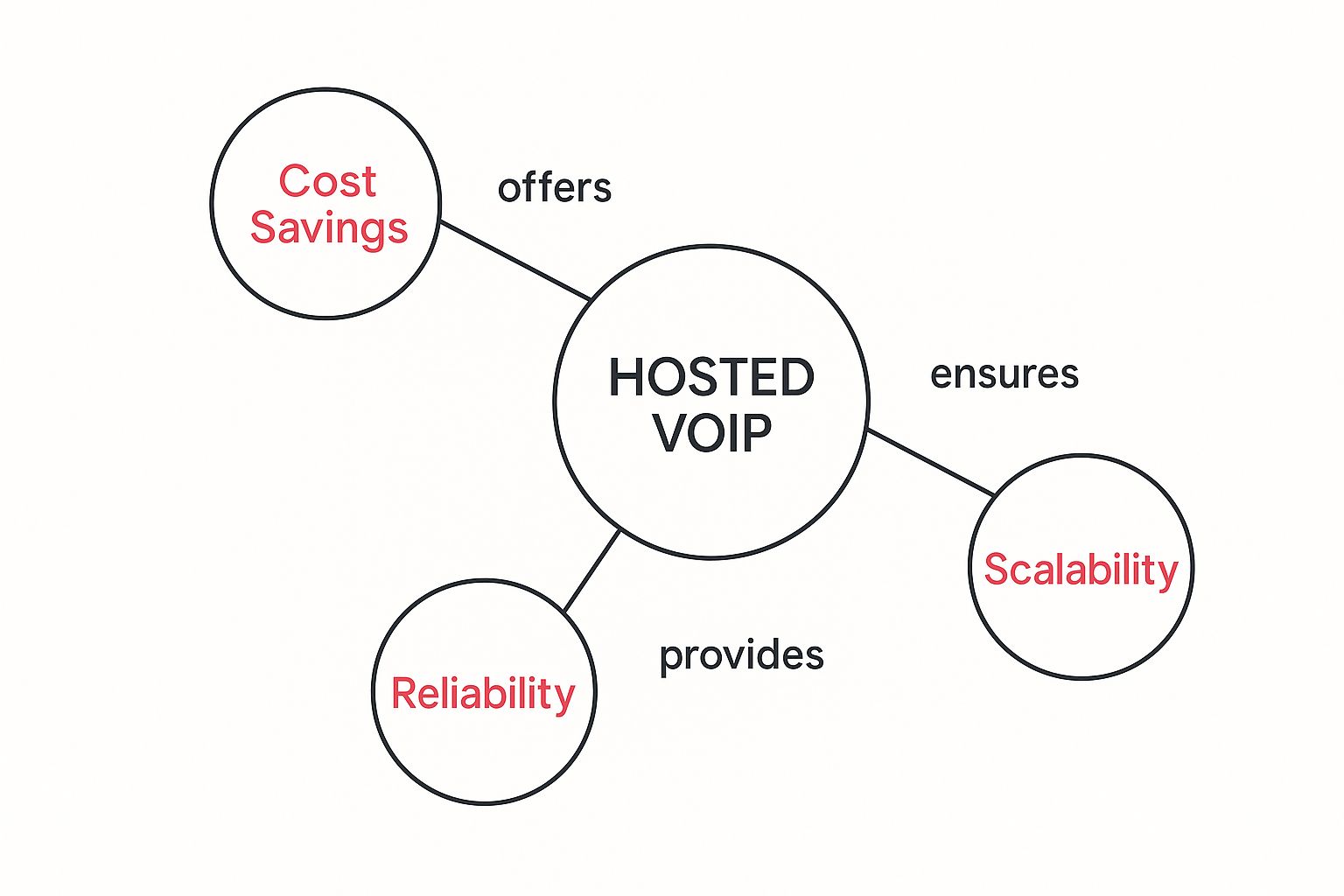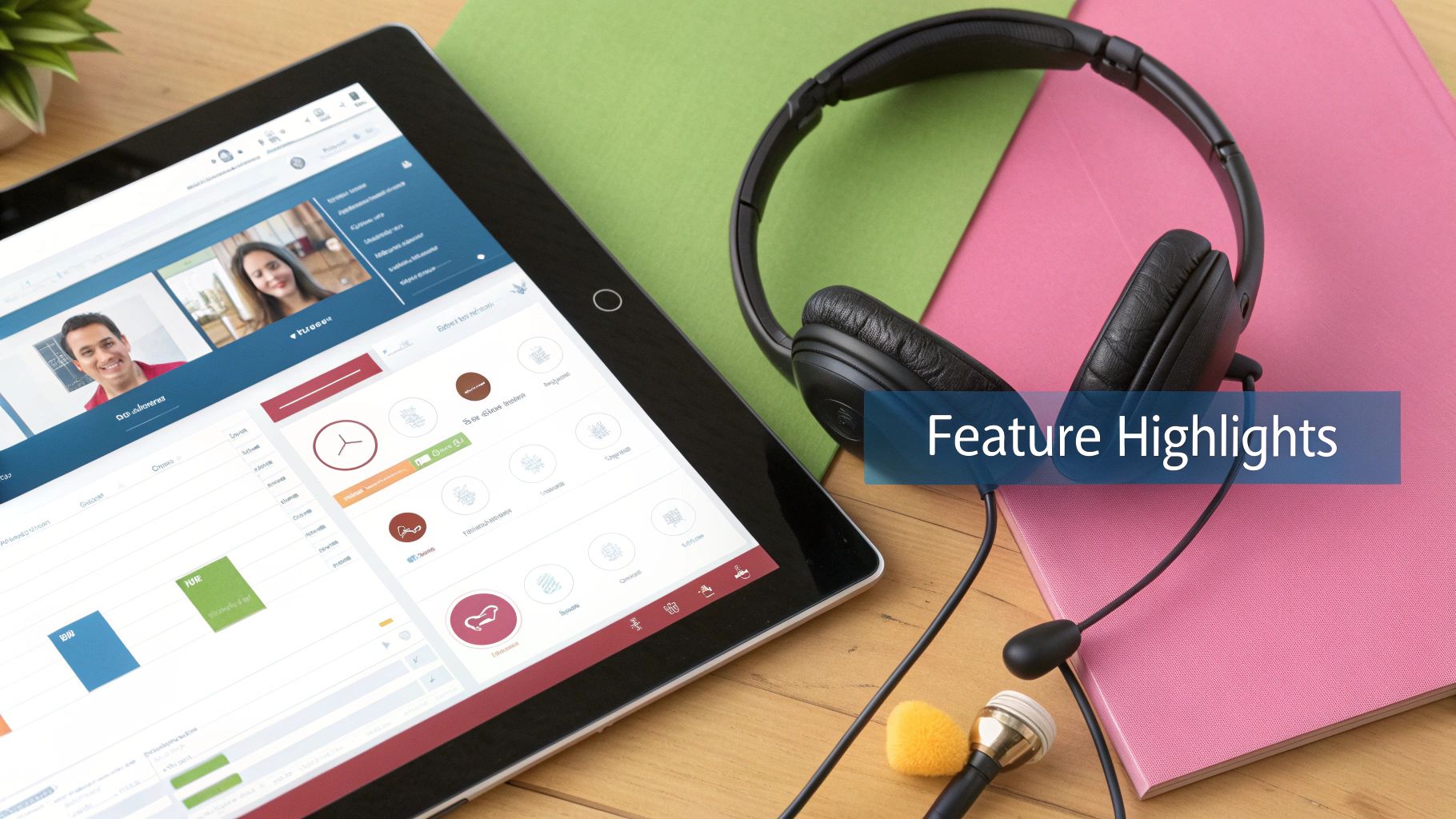Hosted Voice Over IP Guide for UK Businesses
Across the UK, the way businesses talk is changing for good. The old-school ISDN and PSTN networks that have been the backbone of business communication for decades are being switched off. The modern replacement is Hosted Voice over IP, a technology that takes your phone system off the wall and into the cloud. This isn't just a simple tech upgrade; it's a genuine opportunity to rethink how your business communicates.
Why Hosted VoIP Is an Urgent Priority

With the traditional phone networks set for a complete shutdown by December 2026, moving to a new system is now a necessity, not a choice. For years, businesses have relied on ISDN (Integrated Services Digital Network) and PSTN (Public Switched Telephone Network) lines, but that era is coming to a close. This nationwide change is forcing every organisation to modernise its communications setup.
But don't just see this as a box-ticking exercise. Smart businesses are treating this deadline as a catalyst for gaining a competitive advantage. By moving to a hosted voice over IP solution now, you’re not just staying compliant; you're future-proofing your business and unlocking a level of flexibility and efficiency that was impossible with older systems.
Understanding the Hosted VoIP Analogy
Let’s think about it in a way we all understand: how we watch films.
A traditional phone system is like having a huge DVD collection. It needs physical hardware in your office (the DVD player), its features are limited, and it chains you to a single location. If that hardware breaks, the whole system is down.
A hosted VoIP system, on the other hand, is much more like Netflix.
- Cloud-Based: Instead of a box in your comms room, your entire phone system is managed by a provider in a highly secure, remote data centre.
- Accessible Anywhere: Your team can make and receive calls on their business number from literally anywhere with an internet connection – using a desk phone, a laptop, or a mobile app.
- No On-Site Hardware: You get to ditch the bulky, expensive on-premise phone exchange for good.
This model is a perfect fit for today's professional services firms. It seamlessly supports hybrid and remote working, making sure your solicitors, accountants, or consultants are always connected and productive, whether they're at their desk, at home, or out visiting clients.
The move to VoIP is gathering serious pace. By 2025, it's estimated that 31% of UK businesses will have already switched to hosted Voice over IP services, driven largely by the ISDN switch-off. This shift also mirrors major changes in how we work, with 26% of the UK workforce now in hybrid roles. On top of that, the cost savings are compelling, as VoIP can cut communication bills by as much as 75%. You can discover more insights about why UK businesses are switching to VoIP.
How a Hosted VoIP System Actually Works
At its heart, a hosted VoIP system is surprisingly simple. It takes your voice, chops it up into tiny digital packets, and sends them across the internet instead of down a traditional phone line.
Imagine you're sending a parcel. You package the item (your voice is converted into data), label it with an address (the system directs it), and hand it to a courier (your internet connection). It’s a bit like that, only it happens in the blink of an eye.
When you speak into your phone, the system digitises the sound waves and zips those packets over to your provider’s data centre. From there, a powerful digital switchboard takes over, routing your call to its destination—whether that’s another VoIP phone down the hall or a mobile on the other side of the world. The phone on the receiving end simply puts the packets back together into crystal-clear audio.
The Key Components Made Simple
Two bits of technology make this digital conversation work so smoothly: codecs and SIP. Getting your head around these two concepts is the key to understanding how a hosted voice over ip system operates.
-
Codecs – The Digital Translator: A codec (short for coder-decoder) is a smart piece of software that compresses your voice data for efficient travel over the internet, then decompresses it at the other end. Think of it as a translator that ensures your message is both compact for sending and perfectly understood upon arrival. High-definition codecs are the reason VoIP calls can sound even clearer than an old analogue line.
-
SIP – The Digital Postman: Session Initiation Protocol (SIP) is the signalling protocol that does all the legwork. It’s the digital postman that establishes the connection, makes sure the packets are delivered to the right person, and then cleanly ends the call when you hang up.
Because this entire setup is managed by your provider, you can finally say goodbye to that dusty old PBX box in the server cupboard. All the heavy lifting is done in the cloud, on your provider's secure, robust infrastructure. Of course, the quality of the journey for those data packets depends entirely on your internet connection. That’s why it’s so important to know how to choose an internet provider who can deliver the stability needed for perfect calls.
The core difference is simple yet profound. An on-site PBX is a capital expense you have to maintain, secure, and upgrade yourself. A hosted VoIP system is an operational service managed entirely by experts, freeing you to focus on your business.
This infographic shows the main benefits that come from switching to this modern architecture.

By getting rid of the on-site hardware and moving everything to the cloud, businesses see immediate financial savings, effortless scalability, and far greater reliability.
Essential Features for Modern Professional Services

A modern hosted VoIP system is far more than just a substitute for your old analogue phone line. Think of it as a complete communications toolkit, packed with features designed to solve the real-world challenges that professional services firms face every day. These aren't just technical bells and whistles; they are practical tools that sharpen your client service, boost team productivity, and project a polished, credible image.
Instead of just running through a list, let’s look at how these features deliver genuine value in a professional setting. The right setup can completely change how you manage client communication, especially when things get busy.
The Digital Front Desk
Imagine having a perfectly efficient digital receptionist who works 24/7. That's exactly what an auto-attendant does. It greets every caller with a professional, bespoke message and gives them a clear menu of options, guiding them to the right person or department instantly—no human intervention needed.
This single feature is a game-changer for managing inbound calls. It frees up your skilled team members to concentrate on their actual work, rather than acting as a switchboard.
A solicitor's office, for example, could set up an auto-attendant to route callers straight to the right team:
- Press 1 for Conveyancing
- Press 2 for Family Law
- Press 3 for Accounts
- Press 0 to speak with a receptionist
This simple, clean routing ensures a client with an urgent question about a property completion isn’t stuck waiting or put through to the wrong person.
Intelligent and Flexible Call Handling
Intelligent call routing is another cornerstone of a modern hosted voice over IP system. It lets you create clever rules that decide where calls go based on the time of day, the caller's number, or which team members are available. This ensures no critical client call ever rings out or gets lost in the shuffle.
Likewise, voicemail-to-email transcription is a lifesaver for busy consultants or accountants who spend their days in meetings. When a client leaves a voicemail, the system transcribes the audio into text and emails it straight to your inbox. You can discreetly read the message on your phone or laptop, grasp its urgency, and decide on the next step without having to dial in and listen.
An accountancy firm navigating the chaos of tax season uses call queues to handle the surge in client enquiries. Instead of hearing a busy tone, callers are placed in an orderly queue with professional hold music and regular updates on their position. This small touch dramatically improves the client experience and prevents lost opportunities during their most critical time of year.
Hosted VoIP Feature Breakdown for Professional Services
To get a clearer picture, let's break down how these features directly benefit a service-based organisation. The connection between a technical function and a real-world business advantage is often where the true value lies.
| Feature | Description | Benefit for Professional Services |
|---|---|---|
| Auto-Attendant | A digital receptionist that greets callers and routes them using a menu. | Presents a highly professional first impression and ensures clients reach the correct expert immediately. |
| Call Queues | Places incoming callers in a virtual line when all staff are busy, with music or messages on hold. | Prevents missed calls and client frustration during peak periods, improving service and client retention. |
| Voicemail-to-Email | Automatically transcribes voicemails into text and sends them to your email inbox. | Allows busy professionals to review messages discreetly between meetings, ensuring rapid, informed responses. |
| Mobile Integration | Enables your business number to be used on a mobile app, making and receiving calls anywhere. | Provides complete flexibility for remote work or travel, ensuring you never miss a critical client call. |
| Call Recording | Securely records and stores phone conversations for compliance, training, or dispute resolution. | Crucial for regulatory compliance (e.g., financial advice) and serves as an accurate record of client instructions. |
| Unified Communications | Integrates voice calls with other tools like video conferencing and instant messaging in one platform. | Creates a seamless communication flow, making internal collaboration and client meetings more efficient. |
These features aren't standalone gimmicks; they work together to create a cohesive and powerful communication engine for your business.
Many of these capabilities are part of a wider approach you can explore in our guide on what is unified communications, which merges different communication channels into a single, intuitive platform. It’s all about creating a seamless, professional, and efficient environment for any service-based organisation.
The Financial and Operational Case for Switching

Making the move to a hosted voice over IP system is one of the clearest business decisions you can make, built on solid financial savings and genuine operational gains. For most professional services firms, this isn't simply a tech upgrade. It's about building a more agile, efficient, and client-centric operation. The financial argument becomes obvious the moment you stop paying for traditional phone lines.
Think about it: no more expensive line rental fees, no more rigid maintenance contracts for on-site hardware, and no more capital tied up in a physical PBX system that loses value every year. A hosted model neatly converts your communications spend from a hefty capital expenditure into a predictable, manageable operational cost. This shift makes budgeting far easier and frees up cash you can put back into growing your business.
Direct and Indirect Financial Gains
The savings show up straight away on your monthly bill. Most businesses see their communication costs fall dramatically—often by 30% to 50%—after they switch. This is down to cheaper call rates, the complete removal of line rental fees, and zero maintenance overheads.
But the real value goes beyond just cutting costs. A reliable, feature-rich communication system delivers tangible productivity improvements. When your team can connect and collaborate properly from anywhere, they can respond to clients more quickly and work together without friction. This has a direct, positive impact on your firm’s profitability and the quality of your service.
UK businesses that have embraced hosted VoIP are seeing an incredible return. On average, users report a 67% jump in productivity, mostly because they've removed the communication barriers of their old phone systems. What's more, with 83% of instances where companies lost clients or missed deadlines being tied to communication breakdowns, the reliability of VoIP becomes a vital tool for managing business risk. Discover more insights about UK VoIP statistics and how they affect business performance.
A Practical Example: A Law Firm's Transformation
To see how this works in the real world, let’s look at a small, regional law firm. Their 'before' picture was all too common: an old on-site PBX system that was a nightmare to maintain and offered zero flexibility. Solicitors trying to work from home or court were forced to use their personal mobiles, which looked unprofessional and created serious compliance issues.
Their old system was a major operational bottleneck. If the receptionist was tied up, calls went unanswered, and crucial client instructions could easily be missed. In short, the firm was paying a premium for a system that was actively getting in the way of providing responsive, modern legal services.
After moving to a hosted voice over IP solution, the 'after' picture was completely different.
- Cost Reduction: Their monthly communications bill was slashed by over 40%.
- Enhanced Mobility: Solicitors could now use a simple mobile app to make and receive calls from their official office number, no matter where they were. Professionalism, sorted.
- Improved Client Service: An auto-attendant now routes calls to the right person or department, while call queues mean no client ever has to hear a busy signal again.
The change didn't just bring immediate financial relief; it transformed their operational agility. It gave the team the tools to work securely and effectively from any location, future-proofing the practice and strengthening the relationships they had with their clients.
How to Choose the Right UK VoIP Provider
Picking the right partner for your hosted VoIP system is a big decision, and it’s one you want to get right the first time. The UK market is crowded, so finding a provider that genuinely gets the demands of a professional services business is crucial for a smooth switch and future success. A good partner gives you more than just the tech; they deliver reliability, solid security, and support you can count on.
A massive factor should be where the provider is physically based. Insisting on a provider with UK data centres is vital. Why? It drastically shortens the distance your voice data has to travel, which is key for excellent call quality. It also means your sensitive client call data is stored and handled under UK law, keeping you on the right side of GDPR.
Evaluating Pricing and Agreements
Getting your head around the pricing is essential to avoid nasty surprises on your bill. Most providers use a straightforward per-user, per-month model, but you need to dig into what that actually includes. Does it come with a bundle of call minutes, or is every call an extra charge? Bundles can be great value, but only if they match how your business actually makes calls.
Just as important is the Service Level Agreement (SLA). This isn't just a document; it's the provider's contractual promise to you about system performance and reliability.
Look for an SLA that guarantees at least 99.9% uptime. This translates to minimal potential downtime over a year and shows the provider has real confidence in their network. The SLA should also spell out their response times for technical support, so you know exactly how quickly you’ll get help when you need it.
Key Questions for Potential Providers
To choose wisely, you need to ask smart questions. Any provider worth their salt will welcome your scrutiny and give you straight answers. Prepare a checklist so you can properly compare your options and find the perfect match for your firm.
Here are a few non-negotiable questions to start with:
- Where are your data centres located? (This confirms they have a UK-based network for quality and compliance).
- What does your standard support package include? (Find out if you get 24/7 help or just UK office hours).
- Can you explain all potential extra costs? (This is how you uncover hidden fees for extra features, hardware, or call bundles).
- How do you manage the number porting process? (A good answer shows they have the experience to move your existing numbers without any drama).
By asking these direct questions, you can cut through the sales pitch and see what each provider really brings to the table. This step is fundamental to finding a partner that will genuinely support your business. For a deeper dive into different options, our business phone system comparison offers further valuable insights.
The UK hosted VoIP market is growing fast, with forecasts predicting it will expand by around £4.3 billion between 2024 and 2029. This growth is being fuelled by the shift to flexible working and the need for reliable cloud solutions. To navigate this booming market, a thorough, question-led evaluation is your best bet. Read the full research about the UK VoIP market to get a better sense of the trends shaping the industry.
Frequently Asked Questions About Hosted VoIP
When you’re thinking about switching your phone system, a few questions are bound to pop up. It’s a big decision. Here, we'll tackle the most common queries we hear from UK businesses looking into a hosted voice over IP solution, giving you the clear, straightforward answers you need to move forward confidently.
Can I Keep My Existing Business Phone Number?
Yes, absolutely. Keeping your number is standard practice, and it’s managed through a regulated process called ‘porting’. Your new VoIP provider handles the entire transfer from your old service, so there’s no interruption for your clients.
From your customers' perspective, nothing changes. They’ll still dial the same number they’ve always used, and you won’t miss a beat. A good provider will manage all the technical legwork behind the scenes, making the switch feel effortless.
Is The Call Quality As Good As A Landline?
This is a common worry, but the reality is that with a stable internet connection, the call quality of hosted VoIP is often far better than an old analogue line. Modern systems use HD Voice technology which delivers incredibly clear audio. Conversations sound more natural, which helps reduce misunderstandings and fatigue on long calls.
A reputable provider won't just sell you a system; they'll first assess your broadband connection. They need to be sure it has enough bandwidth to support high-quality, reliable calls without any annoying jitter or dropouts. This initial check is a critical step for guaranteeing a flawless service from day one.
Think of it as a pre-flight check for your communications. It ensures everything runs smoothly, reflecting the professional quality of your business.
How Secure Are My Business Calls Over The Internet?
A very valid concern, especially for any business handling sensitive client information. Leading UK providers take security seriously, building in protection at every level. Your conversations are shielded by multiple layers of encryption, like Transport Layer Security (TLS) and Secure Real-time Transport Protocol (SRTP).
These protocols essentially scramble the voice data as it travels across the internet, making it unreadable to anyone trying to listen in. On top of that, the services are housed in secure, monitored UK data centres protected by advanced firewalls. This ensures your communications are safe from cyber threats and remain compliant with GDPR.
What Happens If Our Office Internet Fails?
This question actually highlights one of the biggest advantages of a hosted voice over IP system. If your office internet goes down, your phone system doesn't. Because the core system is based in the cloud, it keeps running completely independently of your local connection.
You can set up rules in advance to automatically reroute calls during an outage, so you never miss that important client call. It’s all about business continuity.
Here are a few practical ways this works:
- Automatic Divert to Mobiles: Inbound calls can be instantly forwarded to key staff members' mobile phones.
- Failover to Another Office: Calls can be seamlessly redirected to a different branch or location if you have one.
- Voicemail-to-Email: Callers can still leave messages, which are then sent straight to your email for immediate action.
This built-in resilience means that even if your local internet has a wobble, your business stays professional, responsive, and open for business. Your clients won't even know there was an issue.
Ready to modernise your business communications with a reliable, UK-based hosted VoIP solution? SES Computers has over 30 years of experience helping businesses across Dorset and the South West make the switch with confidence. Get in touch today for a no-obligation consultation.